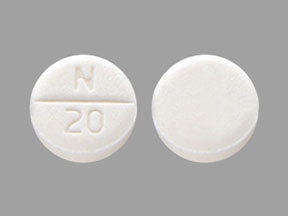Nadolol for Supraventricular Tachycardia User Reviews
Brand names: Corgard
Nadolol has an average rating of 9.6 out of 10 from a total of 5 reviews for the off-label treatment of Supraventricular Tachycardia. 100% of reviewers reported a positive experience, while 0% reported a negative experience.
- Quando
- Taken for 10 years or more
- July 23, 2017
"Have had SVT episodes for over 35 years. IN 1998 my BP jumped up suddenly, so I was prescribed 20mg Nadolol. Worked great on lowering my BP. I have been in the ER several times over the years with SVT attacks, had to have my heart reset a couple times. When the racing kicks in, I can bring it back down with two or three 40mg tablets and avoid the hospital. Helps anxiety and headaches for me as well. Have been on other BP meds that did nothing, but Nadolol is a special med with my body..."
- JB930
- August 8, 2009
"I have had palpitations for 18 years - it affected my life so badly that I eventually became agoraphobic for several years. I could do very little in the way of activity without having episodes. I was started out at 20mg a day and gradually work my way up to 80mg, but the 80mg caused me problems. So I settled in at 40mg a day for many years until a few years ago. I for some reason was having increased episodes in longer durations - at one point having continuous palpitations for 5 hours straight. Not for the faint of heart. I ended up increasing my dosage to 60mg a day with no problems. 40mg and then 12 hours later 20mg. It seems to help and has also lessened the impact of those beats that feel like your heart is jumping out of your chest."
- Dana_...
- December 21, 2017
Corgard (nadolol) "I live in /kazakhstan and I have been using gorgard for 8 years. I have a disease called Catecholaminergic Ventricular tachycardia (CPVT). And corgard is really works. It has lowest side effects. Unfortunatelly it isn't registered in our country. I have to buy it in Russia and the other countries. Thanks for distributors. But as a wish, it would be great to register corgard in our country."
- Quando
- Taken for 10 years or more
- March 24, 2023
Corgard (nadolol) "Corgard is a life-saving medication for me. A few years ago I had to visit the ER, my heart was beating 200bpm, and my blood pressure was 200/125. They did an EKG and gave me a heavy dose, 100mg of Corgard, and within 5 minutes everything was normal."
- Anonymous
- Taken for 10 years or more
- May 28, 2022
"I’ve been on Nadolol since 2010. I have CPVT. I was originally on 120 mg per day, and that did make me tired. In 2014 I had the LCSD procedure, and the doctor added Flecanide and reduced Nadolol to 20mg per day. I started getting horrible leg cramps at night, and learned that it was because of the reduction in Nadolol dose. The doctor had me bump it up to 40 mg per day, and my leg cramps went away. I do not seem to have any side effects from the Nadolol or Flecanide."
Reviews may be edited to correct grammar/spelling or to remove inappropriate language and content. Reviews that appear to be created by parties with a vested interest are not published. This information is not intended to endorse any particular medication. While these reviews may be helpful, they are not a substitute for the expertise, knowledge, and judgement of healthcare professionals.
Learn more about Supraventricular Tachycardia
Care guides
More about nadolol
- Check interactions
- Compare alternatives
- Pricing & coupons
- Reviews (44)
- Drug images
- Side effects
- Dosage information
- During pregnancy
- Drug class: non-cardioselective beta blockers
- Breastfeeding
- En español



Corgard (nadolol) "I have been using Corgard for many years and my resting heart rate, which without the medicine is over 100 but with it is a steady 60-65. Plus I have AF (Atrial Fibrillation)and this has lessened the frequency and length of attacks."